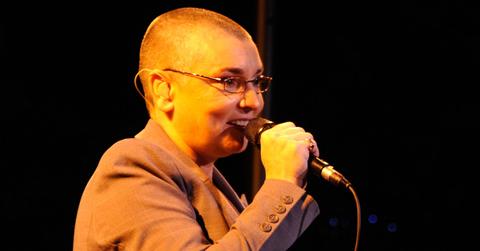Sinéad O’Connor Refused a Grammy to Make a Statement—Here's What She Said
Published July 26 2023, 9:32 p.m. ET

The death of Sinéad O’Connor shocked music fans around the world, who remember the artist as much for her outspoken personality as for her memorable music. Sinéad had several hit songs over her career—but she also made headlines for a number of strong opinions and the controversies that resulted from them. One of those was her choice to refuse a Grammy Award.
It is possible to refuse a Grammy and the reason fans know that is because Sinéad did it in 1991.
The Grammy Awards are one of the pinnacles of achievement in the music industry, and there have been some dust-ups surrounding them over the years. Several artists have withdrawn themselves from Grammy consideration for a variety of reasons.
However, Sinéad is to date the only performer to turn down the actual award itself, and the story behind that bold choice is an interesting one. Keep reading to learn what happened to prompt the "Nothing Compares 2 U" singer to turn down the trophy.
Sinéad O'Connor - Nothing Compares 2 U (Live)
Sinéad O’Connor refused her Grammy Award after winning Best Alternative Music Performance.
Sinéad had a history with the Grammys before her shocking refusal. In 1989, she was nominated for Best Female Rock Vocal Performance for her debut album The Lion and the Cobra. However, she lost the award to Tina Live in Europe by the legendary Tina Turner, who also passed away in 2023.
Two years later, with "Nothing Compares 2 U" being a massive hit, Sinéad picked up four more Grammy nominations: Record of the Year, Best Pop Vocal Performance—Female, Best Music Video—Short Form, and Best Alternative Music Performance. She won the latter category over Kate Bush, Laurie Anderson, World Party, and The Replacements.
But by then, she had also become an increasingly vocal critic of the music industry.
On Feb. 1, 1991, Sinéad sent a letter to the Recording Academy detailing some of her criticisms. "They acknowledge mostly the commercial side of art. They respect mostly material gain since that is the main reason for their existence," she said per the Los Angeles Times, referring to the music business as a whole.
"How can we communicate with and help the human race," she added, "when we have allowed ourselves to be taken out of the world and placed above it?"
While Sinéad clarified later that she was not calling for a boycott of the Grammys specifically, she made clear that she would not perform at the Feb. 20 ceremony or accept an award if she won... which she did. The rest is literally music history.
Her letter didn't fall on deaf ears, either. As Vulture noted, Public Enemy also withdrew from the 1991 ceremony, while Living Colour guitarist Vernon Reid wore a Sinéad O'Connor shirt when accepting the band's award for Best Hard Rock Performance.
Living Colour Wins at 1991 Grammy Awards
What happened after Sinéad O'Connor refused her Grammy Award?
While Sinéad's choice to refuse her Grammy sent shockwaves through the music community, it didn't stop the Recording Academy from continuing to recognize her work. She was nominated three more times: in 1992 for Best Music Video—Long Form ("Year of the Horse"), in 1994 for Best Music Video—Short Form ("Fire On Babylon"), and in 1996 for Best Music Video—Short Form ("Famine").
However, she never won a Grammy Award again.
In the big picture, though, that didn't matter to her or to her overall career. Sinéad won several other awards in her lifetime and was even nominated for a Golden Globe Award in 2012 for "Lay Your Head Down" from the film Albert Nobbs.
More importantly, she continued to speak out on topics she felt were important, from her mental health struggles to the Catholic Church sexual abuse scandal, even asking multiple Popes to excommunicate her from the Church, according to The Guardian.
Sinéad's Grammy refusal was just one example of how she was determined to use her music as a platform for more than entertainment. Fans may not always have agreed with her stance (remember her controversial Saturday Night Live appearance?) but there's no denying that she made an impact beyond having hit singles and popular albums.